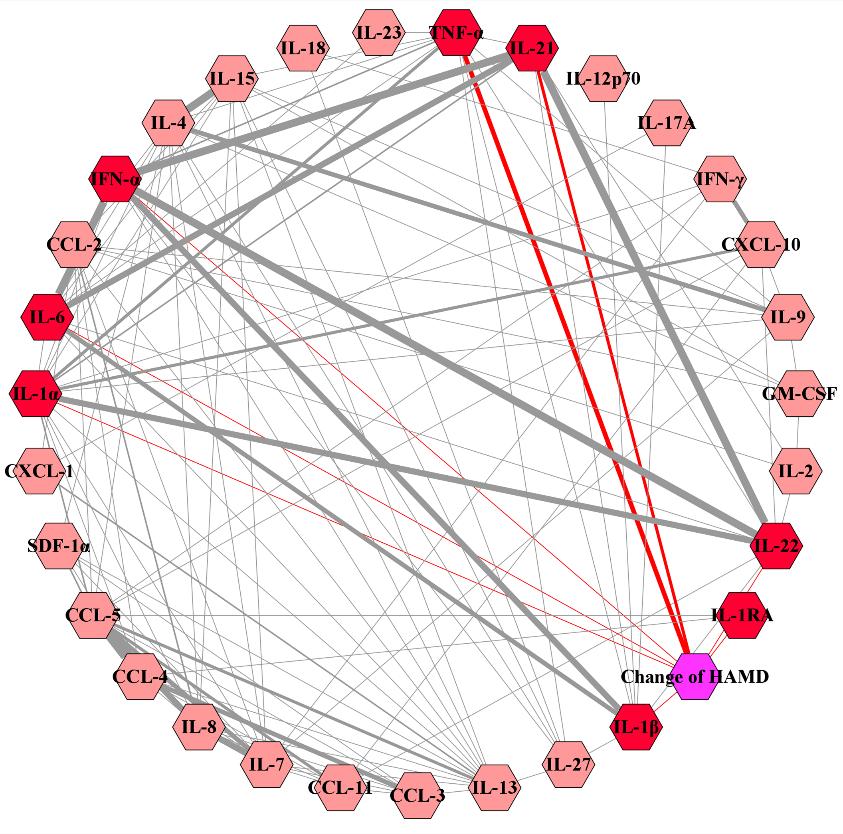中国神经再生研究(英文版) ›› 2024, Vol. 19 ›› Issue (9): 2036-2040.doi: 10.4103/1673-5374.389360
枸杞多糖对阈下抑郁青少年细胞因子的影响:一项随机对照临床试验的中期结果分析
Effects of Lycium barbarum polysaccharide on cytokines in adolescents with subthreshold depression: a randomized controlled study
Xiaoyue Li1, 2, Tao Liu1, 2, Xuan Mo3, Runhua Wang1, 2, Xueyan Kong3, Robin Shao1, 2, Roger S. McIntyre4, 5, 6, Kwok-Fai So1, 7, 8, *, Kangguang Lin1, 2, 8, *
- 1Department of Affective Disorders, The Affiliated Brain Hospital of Guangzhou Medical University (Guangzhou Huiai Hospital), Guangzhou, Guangdong Province, China; 2Key Laboratory of Neurogenetics and Channelopathies of Guangdong Province and the Ministry of Education of China, Guangzhou Medical University, Guangzhou, Guangdong Province, China; 3Department of Psychiatry, The Fifth Affiliated Hospital of Guangzhou Medical University, Guangzhou, Guangdong Province, China; 4Mood Disorders Psychopharmacology Unit, Poul Hansen Family Centre for Depression, University Health Network, Toronto, ON, Canada; 5Department of Psychiatry, University of Toronto, Toronto, ON, Canada; 6Brain and Cognition Discovery Foundation, Toronto, Canada; 7Ministry of Education Joint International Research Laboratory of CNS Regeneration, Jinan University, Guangzhou, Guangdong Province, China; 8Neuroscience and Neurorehabilitation Institute, University of Health and Rehabilitation Sciences, Qingdao, Shandong Province, China
摘要: 累积证据支持抑郁症状和炎症反应之间存在关联,且抗炎治疗可部分改善抑郁症状。由于从中药枸杞中提取的枸杞多糖具有显著的抗氧化和抗炎作用,且作者最近的随机双盲安慰剂对照试验已发现枸杞多糖可减轻阈下抑郁青少年的抑郁症状,因此推测枸杞多糖的抗抑郁作用可能与其对炎性细胞因子的影响有关。由此进行了这项双盲随机安慰剂对照试验,招募了29例阈下抑郁青少年,随机分为枸杞多糖组和安慰剂组,前者每天给予枸杞多糖 300 mg/d,其中24例患者完成了6周的随访,其中枸杞多糖组14例(15.36±2.06岁,3男11女),安慰剂组10例(14.9±1.6岁,2男8女)。结果发现,与安慰剂组相比,枸杞多糖组6周后白细胞介素17A降幅更大。进一步网络分析发现,枸杞多糖还能效地减少炎性细胞因子之间的相关性和连通性,且这一变化与抑郁症状的显著改善有关。这一结果提示,连续6周服用枸杞多糖会通过可通过降低白细胞介素17A水平来抑制免疫反应,从而发挥抗抑郁作用。
https://orcid.org/0000-0003-4027-5554 (Kangguang Lin)

